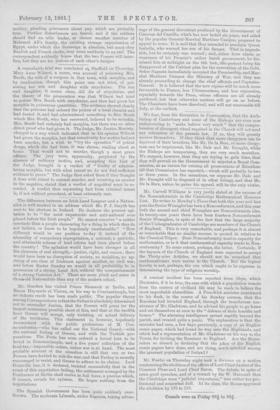A remarkable trial was concluded at Sheffield on Thursday. Mary
Anne Wilmot, a nurse, was accused of poisoning Mrs. Booth, the wife of a surgeon in that town, with morphia, and by implication, though this point was not tried, of poi- soning her son and daughter with strychnine. The son and daughter, it seems clear, did die of strychnine, and the theory of the prosecution was that Wilmot had tried to poison Mrs. Booth with strychnine, and then had given her morphia in poisonous quantities. The evidence showed clearly that the prisoner had ordered the poison of a local chemist and had denied it, and had administered something to Mrs. Booth which Mrs. Booth, who has recovered, believed to be morphia. Mrs. Booth had certainly had morphia, but there was no other -direct proof who had given it. The Judge, Mr. Justice Manisty, 'charged in a way which indicated that in his opinion Wilmot had given the morphia, but that conceivably her motive had not been murder, but a wish to "try the operation" of potent drugs, which she had been, it was shown, reading about at home. That would not be murder, though a most grave offence. The jury were, apparently, perplexed by the absence of ordinary motive, and, accepting this hint of the Judge, brought in a verdict of " Guilty of adminis- tering morphia, but with what intent we do not find sufficient evidence to prove." The Judge then asked them if they thought it done with intent to commit murder, and receiving an answer in the negative, stated that a verdict of acquittal must be re-
• corded, A verdict thus separating fact from criminal intent is, if not without precedent, at least extremely rare.


































 Previous page
Previous page